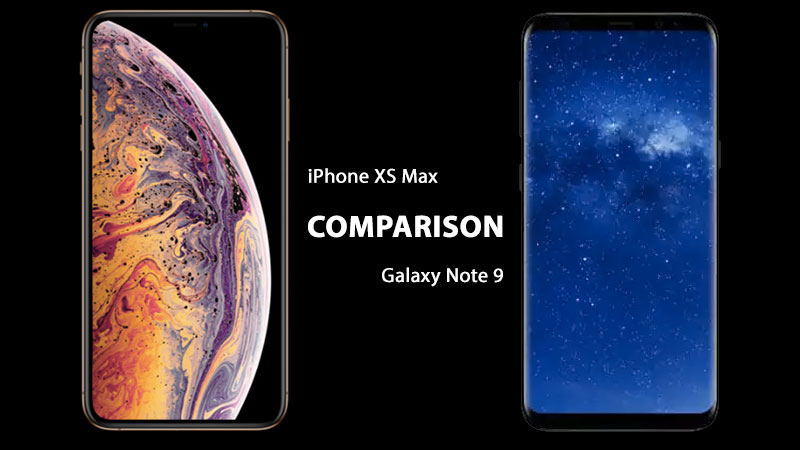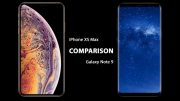With iPhone XS Max, Apple now has a perfect response to Samsung’s Galaxy Note 9 phablet. A 5.8-inch display (as found on the iPhone X) was not enough for though who love massive screens on their smartphones. This is why Apple has launched a gigantic 6.5-inch iPhone XS Max effectively filling the gap and takes on Galaxy Note lineup.

Samsung has struggled to sell its 2018 Galaxy S9 smartphones, however, the initial response to Galaxy Noye 9 has been positive, thanks to its beautiful and big display and excellent cameras. If you’re out to buy a larger screen smartphone, the iPhone XS Max and the Galaxy Note 9 are going to be your top choices. However, the question that one should be asking is what’s the difference between iPhone XS Max and Galaxy Note 9? Which is better and why? Let’s find out by comparing the features and specs of both devices.
Difference between iPhone XS Max and Samsung Galaxy Note 9
Here is a detailed comparison of key differences between Samsung Galaxy Note 9 vs Apple iPhone XS Max.
Design
- iPhone XS Max – 157.5 x 77.4 x 7.7 mm Dimensions, 208g weight, IP68 certified waterproofing
- Galaxy Note 9 – 161.9 x 76.4 x 8.8mm dimensions, 201g weight, IP68 certified waterproofing
Galaxy S9 is taller and thicker than the iPhone XS Max due to the visible bezels at the top and bottom of the devices. However, the Note 9 is not as wider as the XS Max, thanks to the curved display on Samsung’s flagship device. Note 9 is also bulkier of the two handsets and both are not easy to handle with one hand.
Apple has made iPhone XS Max with stainless steel chassis giving it a more premium feel as compared to the aluminum made Note 9. Both phones feature a glass design.
Display
- iPhone XS Max – 6.5-inch OLED, 2688 x 1242 pixels, resolution 458 ppi pixel density, 3D Touch
- Galaxy Note 9 – 6.4-inch curved OLED, 1440 x 2960 pixels resolution, 516 ppi pixel density
The Galaxy Note 9 comes with a beautiful 6.4-inch Super AMOLED display which is curved on the edges. The display has 516 ppi pixel density. The Note 9 is not bezel-less and small chin is there at the top and bottom with an 83.51 percent body-to-screen ration
iPhone XS Max, on the other hand, features a 6.5-inch OLED display with a 458ppi pixel density. While the Note 9 has a higher pixel density, the iPhone XS manages to offer bigger display in a compact chassis.
Display Mate has already crowned Note 9 with the best smartphone display out there, but we are expecting Apple to snatch that title once the company put the iPhone XS Max’s display under its microscopic analysis.
Cameras
- iPhone XS Max – Dual 12MP camera, f/1.8 and f/2.4 aperture, Smart HDR, Portrait mode with advanced bokeh and Depth control
- Galaxy Note 9 – Dual 12MP camera, variable f/1.5, and f/2.4 aperture, Auto HDR, Live Focus with adjustable bokeh effect
Both handsets feature an almost similar camera on the rear. Both have a 12MP dual-camera setup with one wide-angle lens and a secondary 12MP telephoto lens. Note 9 has a better, wider and variable aperture. iPhone XS offers more features through its Portrait mode, though Note 9 has a similar feature but not as extensive.
On the front side, Note 9 has an 8MP camera with f/1.7 aperture while the iPhone XS Max features a 7MP TrueDeptch camera with f/2.2 aperture that supports portrait mode. Samsung’s front-facing cameras are known for destroying most of the photos by automatically applying a good amount of smoothening and sharpening. While the iPhone XS captures more realistic looking pictures.
Processor
- iPhone XS Max – A12 Bionic chipset, 7nm make, 6-core CPU, 4-core GPU, 8-core Neural engine
- Galaxy Note 9 – Octa-core Exynos 9810/Snapdragon 845 chip clocked @2.7/2.8GHz, 10nm make
Galaxy Note 9 features Qualcomm’s Snapdragon 845/Exynos 9810 which is the latest chipset one can find on any Android smartphone. However, Apple’s A12 Bionic is a monster at another level in terms of performance. It features the 7nm fabrication process, an 8-core neural engine, and a 6-core CPU. This leaves Samsung way behind the Apple’s offering.
Storage & RAM
- iPhone XS Max – 64GB, 256GB, 512GB
- Galaxy Note 9 – 128GB, 512GB, microSD card slot
Storage is one prominent department where Samsung Galaxy Note 9 easily beats iPhone XS Max. Apple is offering 64GB as base storage for the iPhone XS Max, while Samsung has offered Galaxy Note 9 base model with 128GB internal storage. And on top of that, the Note 9 has a microSD slot that supports up to 512GB external memory. With a maxed out 512GB NOte 9 and a 512GB microSD card, one can get a total storage of 1TB on Note 9.
The Galaxy Note 9 comes with 6GB RAM module, while the iPhone XS comes with 4GB RAM. The 512GB Note 9 variant comes with 8GB RAM (twice the size of iPhone XS Max’s RAM)
Connectivity
- iPhone XS Max – Dual SIM/eSIM, Gigabit LTE, Lightning Connector
- Galaxy Note 9 – Dual SIM, 1.2Gbps LTE, 3.5mm headphone jack, USB Type-C
Samsung’s Galaxy Note 9 reigns the connectivity area in comparison to iPhone XS Max. The Note 9 comes with two physical SIM slots while the iPhone XS Max supports one physical and one eSIM. The Note 9 supports a faster 1.2Gbps LTE download speeds while iPhone XS Max offers Gigabit LTE support at best. The Galaxy Note 9 has a 3.5mm headphone jack which is missing from the iPhone counterpart.
Biometric Authentication
- iPhone XS Max – Face ID
- Galaxy Note 9 – Iris scanner, Fingerprint scanner, Face unlock
iPhone XS Max comes with only one form of biometric authentication i.e. Face ID – Facial scanning. On the other hand, Samsung Galaxy Note 9 features three different authentication functions including a fingerprint scanner, Facial scanner, and Iris scanner.
Battery Life and Charging
- iPhone XS Max – 65 hours audio playback, 15 hours video playback, 13 hours internet use, 7.5W wireless charging, 18W wired charging,
- Galaxy Note 9 – 4,000mAh battery, 59 hours audio playback, 20 hours video playback, 17 hours internet use, 10W Fast wireless charging, 15W wired charging,
Pricing
- iPhone XS Max – Starts from $1,099
- Galaxy Note 9 – Starts from $999
While the official price for Samsung Galaxy Note 9 is $999 for the base model, one can easily get it at a few hundred bucks lower price. If not the price, the retailers will sweeten the offer by adding a free Galaxy Watch or wireless charger. The 8GB Note 9 with 512GB storage costs $1,250.
iPhone XS Max base model starts from $1,099 and goes all the way up to $1,449.
Note 9 bundles an S-Pen which is a unique device and appeals to a certain section of users.
Note 9 vs iPhone XS Max – Specs comparison
Here is a details comparison of hardware specs of iPhone XS Max and Galaxy Note 9:
| iPhone XS Max | Galaxy Note 9 | ||
|---|---|---|---|
General |
Announced | September 12, 2018 | August, 2018 |
| Released | September 21, 2018 | August, 2018 | |
Body |
Dimensions | 157.5 x 77.4 x 7.7 mm | 161.9 x 76.4 x 8.8 mm |
| Weight | 7.34 ounces (208 grams) | 7.09 ounces (201 grams) | |
| Color | Space Gray, Silver, Gold | Lavender Purple, Ocean Blue, Metallic Copper, Midnight Black | |
| Material | Glass, Surgical-Grade Stainless Steel | Glass, Aluminum Frame | |
| Water & Dust Resistance | IP68 (maximum depth of 2 meters up to 30 minutes) | IP68 certified – dust/water proof over 1.5 meter and 30 minutes | |
Display |
Display Type | OLED | Super AMOLED |
| Screen Size | 6.5-inch | 6.4-inch | |
| Resolution | 1242 x 2688 pixels | 1440 x 2960 pixels | |
| Pixel Density | 458ppi | 516 ppi | |
| Display Features | True Tone Display, HDR display, 3D Touch, All-screen | Corning Gorilla Glass 5, HDR10 Compliant, Always-on display | |
Hardware & Software |
Chipset | Apple A12 Bionic (6 cores) with Neural engine | Exynos 9810 Octa – EMEA, Qualcomm SDM845 Snapdragon 845 – USA & China |
| GPU | 4-Cores | Mali-G72 MP18 – EMEA, Adreno 630 – USA & China |
|
| RAM | – | 6GB / 8GB | |
| Internal Storage | 64GB, 256GB, 512GB | 128GB / 512GB | |
| External Storage | N/A | microSD, up to 512GB (uses SIM 2 slot) | |
| SIM Card | Dual SIM (nano-SIM and eSIM) For China Two Physical SIMs |
Hybrid Dual SIM | |
| NFC | Apple Pay | Samsung Pay | |
| Sensors | Face ID (Facial recognition), Barometer, Three-axis gyro, Accelerometer, Proximity sensor, Ambient light sensor | Iris scanner, fingerprint (rear-mounted), gyro, compass, accelerometer, proximity, barometer, heart rate, SpO2 | |
| OS | iOS 12 | Android 8.1 (Oreo) | |
Camera |
Main Camera | 12MP Dual: Wide-angle: Æ’/1.8 aperture Telephoto: Æ’/2.4 aperture 4K – @24fps, @30fps, @60fps 1080p – @30fps @60fps @120fps @240fps 720p – 30fps |
12MP Dual: Wide-angle: Æ’/1.5 aperture Telephoto: Æ’/2.4 aperture 2160p@60fps, 1080p@240fps, 720p@960fps |
| Front Camera | 7MP – Æ’/2.2 aperture 1080p HD video recording Animoji |
8MP – Æ’/1.7 aperture 1440p – @30fps |
|
| Camera Features | Smart HDR, Portrait Lighting, Portrait mode, Optical zoom; digital zoom up to 10x, Dual optical image stabilization, Quad-LED True Tone flash with Slow Sync | OIS, LED flash, 2x Optical zoom, auto-HDR, panorama | |
Battery |
Battery Type | Li-Ion battery, Non-removable | Li-Ion battery, Non-removable |
| Battery Capacity | 4000mAh | ||
| Features | Wireless Charging, Fast Wired Charging, Non-Removable | wireless charging, Fast Wired Charging, Non-Removable | |
| Wireless Charging | Yes, Works with Qi chargers | Yes, Works with Qi chargers | |
Connectivity |
Wi-Fi | 802.11ac Wi?Fi with MIMO | 802.11 a/b/g/n/ac |
| Bluetooth | v5.0 | v5.0 | |
| USB | Lightning | 3.1, Type-C 1.0 reversible connector |
What do you think about the Galaxy Note 9 and iPhone XS Max? Between the two, which one would you prefer? Drop a comment and let us know!
The post iPhone XS Max vs Samsung Galaxy Note 9 – What’s the Difference? appeared first on iPhoneHeat.




